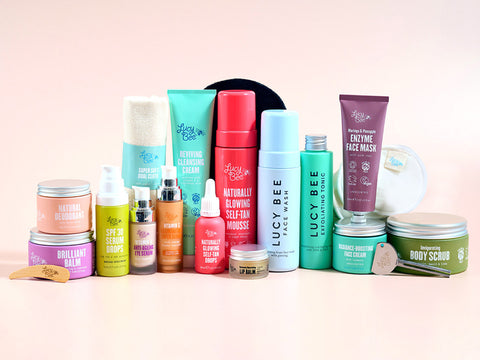What is menopause?
Menopause is when your period stops for 12 consecutive months, and during this oestrogen, progesterone and testosterone (hormones) productions decrease. This decrease in hormones leads to menopausal symptoms including changes to health, as well as changes to the skin.

What is perimenopause?
Perimenopause happens before menopause. During perimenopause oestrogen levels begin to fluctuate and periods become more irregular. This change in oestrogen levels impacts the skin and can make it more prone to redness, sensitivity, spots, breakouts and dryness, as well as an increase in water loss from the skin and changes to the skin barrier.
What impact does oestrogen levels have on the skin?
When oestrogen levels decrease this impacts the appearance and texture of the skin due to the role that this hormone plays in collagen production.
What is collagen?
Collagen is a protein found within the connective tissue of our skin, hair, muscles, joints and blood vessels. Collagen helps to maintain the structure, durability, and strength of our skin, keeping it looking firm and supple.

What happens to the skin during menopause?
Studies have found that during the first five years of menopause, a woman’s skin loses around 30% of its collagen, and after this first five years collagen levels decline more steadily. Cell renewal and turnover slows down, leading to duller skin.
There is also a decrease in fat under the skin as well as elasticity, which can lead to skin becoming thinner and less resilient and increase the appearance of fine lines and wrinkles and sagging of the skin.
There can also be other changes to skin such as increased sensitivity and redness, and more prone to dryness due to decrease in oil gland activity and natural moisture factor activity in the skin.
Hot flushes and night sweats can also cause skin to become more prone to redness too.
In other cases of menopause, acne can occur due to the fluctuation and changes in hormones.
Some common skin changes that women may experience during menopause include:
- Increased dryness: The decrease in oil production can lead to dry, itchy skin.
- Thinning skin: Loss of collagen and elastin can make the skin thinner and more fragile.
- Hyperpigmentation: Hormonal fluctuations can cause dark spots or patches to appear on the skin.
- Acne: Some women may experience acne breakouts due to hormonal imbalances.
Skincare Routine for Menopause

When it comes to looking after skin during menopause it may be best to try and keep your skincare routine simple and look for products that are specific to your skin needs.
If your skin is drier, opt for more hydrating ingredients; for sensitivity, look for gentle and soothing ingredients; dullness and pigmentation, look for ingredients to brighten and even skin tone; for wrinkles and fine lines, look for products which stimulate collagen synthesis.
Cleansers
With cleansers, look for cream or oil-based cleansers which work to lock in moisture and hydrate the skin and will help reduce dryness.
Serums
Serums can be used to target specific skin concerns whether it’s pigmentation, dryness, redness, or increasing collagen synthesis.
Exfoliants
Chemical exfoliants AHAs and PHAs can help to increase cell renewal and remove dead skin cells, helping to remove dull and dry skin and even skin tone.
Moisturisers
As oil glands aren’t as active as they previously were, your skin may be more prone to dryness. Look for moisturisers which contain ingredients to lock moisture into the skin, helping to relieve it from feeling tight and irritated.
SPF
Use an SPF every day. Opt for one that is SPF 30 or above to help protect your skin from UV rays which are responsible for premature skin ageing and sun damage, plus increasing your risk of skin cancer. Sun damage causes elastin and collagen in your skin to breakdown. Premature skin ageing caused by UV rays are responsible for the development of wrinkles. Changes in hormones can impact skin quality and the appearance of wrinkles.
Active Ingredients
Look for products that help with stimulating collagen synthesis, this can be through ingredients like retinol, retinol alternatives, peptides and vitamin C.

The most important thing is finding a routine that works for your skin and being consistent with it.
Shop Lucy Bee Skincare here
Read our blog Lucy Bee Skincare Routine for Menopausal Skin here


